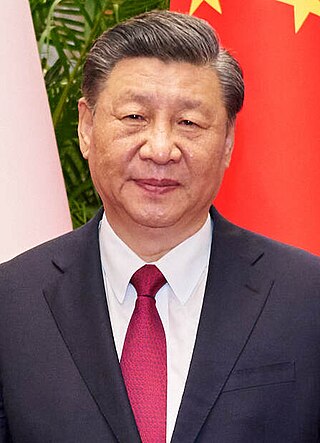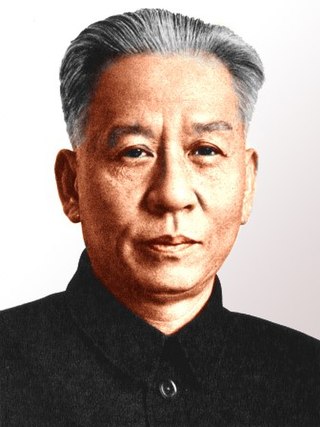
The Politburo Standing Committee (PSC), officially the Standing Committee of the Political Bureau of the Central Committee of the Communist Party of China, is a committee consisting of the top leadership of the Chinese Communist Party (CCP). Historically it has been composed of five to eleven members, and currently has seven members. Its officially mandated purpose is to conduct policy discussions and make decisions on major issues when the Politburo, a larger decision-making body, is not in session. According to the party's constitution, the General Secretary of the Central Committee must also be a member of the Politburo Standing Committee.

Rosamond Soong Ch'ing-ling was a Chinese political figure. As the third wife of Sun Yat-sen, then Premier of the Kuomintang and President of the Republic of China, she was often referred to as Madame Sun Yat-sen. She was a member of the Soong family and, together with her siblings, played a prominent role in China's politics prior to and after 1949.

The Standing Committee of the National People's Congress (NPCSC) is the permanent body of the National People's Congress (NPC), the national legislature of China. It exercises the powers of the NPC when it is not in session.
The orders of precedence in China is the ranking of political leaders in China for the purposes of event protocol and to arrange the ordering of names in official news bulletins, both written and televised. It is also sometimes used to assess perceived level of political power. Although there is no formally published ranking, there is usually an established convention and protocol, and the relative positions of Chinese political figures can usually be deduced from the order in meetings and especially by the time and order in which figures are covered by the official media. Since 1982, the General Secretary of the Chinese Communist Party has been the highest-ranking official in the People's Republic of China (PRC).

The Central Committee, officially the Central Committee of the Communist Party of China, is the highest organ when the national congress is not in session and is tasked with carrying out congress resolutions, directing all party work, and representing the Chinese Communist Party (CCP) externally. It is currently composed of 205 full members and 171 alternate members. Members are nominally elected once every five years by the National Congress of the Chinese Communist Party. In practice, the selection process is done privately, usually through consultation of the CCP's Politburo and its corresponding Standing Committee.

The government of the People's Republic of China is based on a system of people's congress within the parameters of a unitary communist state, in which the ruling Chinese Communist Party (CCP) enacts its policies through people's congresses. This system is based on the principle of unified state power, in which the legislature, the National People's Congress (NPC), is constitutionally enshrined as "the highest state organ of power." As China's political system has no separation of powers, there is only one branch of government which is represented by the legislature. The CCP through the NPC enacts unified leadership, which requires that all state organs, from the Supreme People's Court to the President of the People's Republic of China, are elected by, answerable to, and have no separate powers than those granted to them by the NPC. By law, all elections at all levels must adhere to the leadership of the CCP. The CCP controls appointments in all state bodies through a two-thirds majority in the NPC. The remaining seats are held by nominally independent delegates and eight minor political parties, which are non-oppositional and support the CCP. All government bodies and state-owned enterprises have internal CCP committees that lead the decision-making in these institutions.

The vice president of the People's Republic of China, commonly called the vice president of China, is the deputy to the president of the People's Republic of China, the state representative of China.

The chairman of the Central Military Commission is the head of the Central Military Commission (CMC) and the commander-in-chief of the People's Liberation Army (PLA), the People's Armed Police (PAP) and the Militia. The officeholder is additionally vested with the command authority over China's nuclear arsenals.
The 8th Central Committee of the Chinese Communist Party was in session from 1956 to 1969. It was preceded by the 7th Central Committee of the Chinese Communist Party. It held 12 plenary sessions in this period of 13 years. It was the longest serving central committee ever held by the Communist Party.

The 9th National People's Congress (NPC) was in session from 1998 to 2003. It held five plenary sessions in this period. It followed the final session of the 8th National People's Congress. There were 2,979 deputies to this Congress.

The 7th National People's Congress (NPC) was in session from 1988 to 1993. It held five sessions in this period.

The 6th National People's Congress (NPC) was in session from 1983 to 1988. It held five sessions in this period.

The 3rd National People's Congress (NPC) was in session from 1964 to 1975. It held only one session in the ten years due to the disruption caused by the ongoing Cultural Revolution launched by Chairman Mao Zedong after 1966.

The 1st National People's Congress (NPC) was in session from 1954 to 1959. It held four sessions in this period. There were 1,226 deputies to the Congress. These were the first legislative elections to take place after the founding of the People's Republic of China.

The chairman of the Standing Committee of the National People's Congress is the presiding officer of the Standing Committee of the National People's Congress (NPCSC), which is the permanent body of the National People's Congress (NPC), the national legislature of China.

The National People's Congress (NPC) is the highest organ of state power of the People's Republic of China. The NPC is the only branch of government in China, and per the principle of unified power, all state organs from the State Council to the Supreme People's Court (SPC) are subservient to it. With 2,977 members in 2023, it is the largest legislative body in the world. The NPC is elected for a term of five years. It holds annual sessions every spring, usually lasting from 10 to 14 days, in the Great Hall of the People on the west side of Tiananmen Square in Beijing.
The Presidium of the National People's Congress is the presiding body of the National People's Congress when it is in session.

Liu Shaoqi was a Chinese revolutionary and politician. He was the chairman of the Standing Committee of the National People's Congress from 1954 to 1959, first-ranking vice chairman of the Chinese Communist Party from 1956 to 1966, and the chairman of the People's Republic of China, the head of state from 1959 to 1968. He was considered to be a possible successor to Mao Zedong, but was purged during the Cultural Revolution.

The President of the People's Republic of China, commonly called the President of China, is the state representative of the People's Republic of China, which on its own is a ceremonial office and has no real power in China's political system. However, since 1993, the post has been held by the general secretary of the Chinese Communist Party (CCP) and chairman of the Central Military Commission, who is China's de facto leader.
The 2023 National People's Congress, officially the First Session of the 14th National People's Congress, was held in March 2023 at the Great Hall of the People in Beijing, China. The session opened on 5 March and concluded on 13 March. Major state positions of China were elected in this session.










